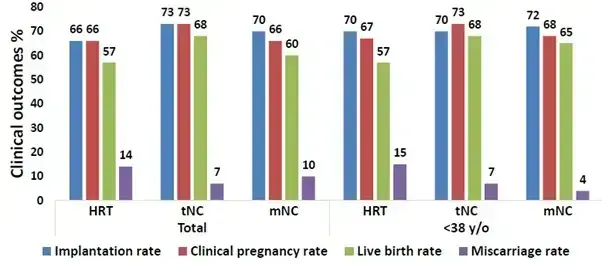
Academic Achievement
- Home
- About
- Academic Achievement
- 2024 Academic Publications
- Improving Frozen Embryo Transfer Outcomes: A Comparative Study on Endometrial Preparation Protocols and Their Impact on Pregnancy and Neonatal Outcomes
Improving Frozen Embryo Transfer Outcomes: A Comparative Study on Endometrial Preparation Protocols and Their Impact on Pregnancy and Neonatal Outcomes
Share
Presented by NUWA Fertility at the 2024 Taiwan Society for Reproductive Medicine (TSRM)

At the 2024 TSRM annual meeting, NUWA Fertility presented a retrospective study comparing pregnancy and neonatal outcomes following frozen embryo transfers (FET) of euploid embryos, using different endometrial preparation protocols.
This research offers valuable clinical insight into selecting the most appropriate preparation method for individual patients undergoing FET.
Background: Choosing the Right Endometrial Preparation Method
In FET cycles, proper endometrial preparation is critical to successful implantation. Common clinical approaches include:
- Hormone Replacement Therapy (HRT)
- True Natural Cycle (tNC)
- Modified Natural Cycle (mNC)
This study aimed to assess whether these different protocols affect pregnancy rates, live birth rates, and neonatal health outcomes when transferring embryos confirmed as chromosomally normal via preimplantation genetic testing.

Study Results: Performance Trends Across Protocols
The study analyzed data from 366 patients treated between April 2021 and June 2023:
- HRT group (n = 165)
- tNC group (n = 82)
- mNC group (n = 119)
Primary Outcomes:
- Outcome HRT tNC mNC
- Implantation Rate 66% 73% 70%
- Clinical Pregnancy Rate 66% 73% 66%
- Live Birth Rate 57% 68% 60%
- Miscarriage Rate 14% 7% 10%
While the three groups showed no statistically significant differences in implantation or clinical pregnancy rates, a notable trend was observed:
The tNC group had the highest live birth rate (68%) and lowest miscarriage rate (7%), suggesting potential advantages—especially in younger patients with regular ovulatory cycles.
Neonatal Outcomes: No Significant Differences Among Protocols
The study also evaluated neonatal outcomes, including birth weight and overall newborn health.
Results indicated no significant differences between groups, suggesting that the choice of endometrial preparation protocol does not adversely impact neonatal health.
Conclusion & Clinical Implications: Toward More Personalized Care
This study concludes that while overall differences in clinical outcomes among the protocols were minimal, the true natural cycle (tNC) protocol showed favorable trends in live birth and miscarriage rates. These trends were more pronounced in younger patients with normal ovulation.
The findings support a personalized medicine approach, offering clinicians evidence-based guidance when selecting an endometrial preparation strategy—taking into account age, ovulatory function, and patient preferences to optimize outcomes.
At NUWA Fertility, we continue to monitor the latest research and apply evidence-based practices to tailor endometrial preparation protocols to each patient’s unique physiology and goals.
Through precision medicine and compassionate care, our aim is to maximize the success of frozen embryo transfers and help more families realize their dreams of parenthood.
Seminars

